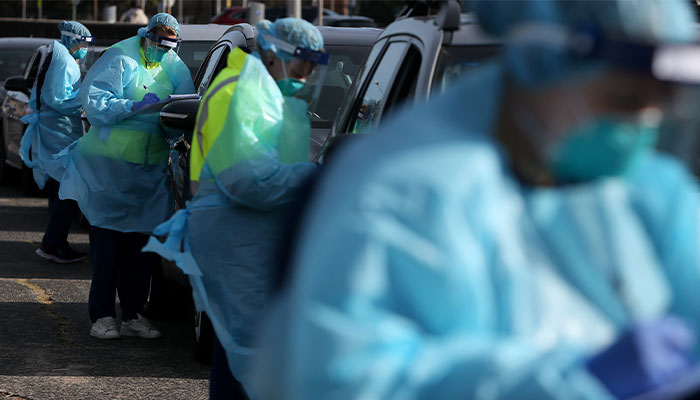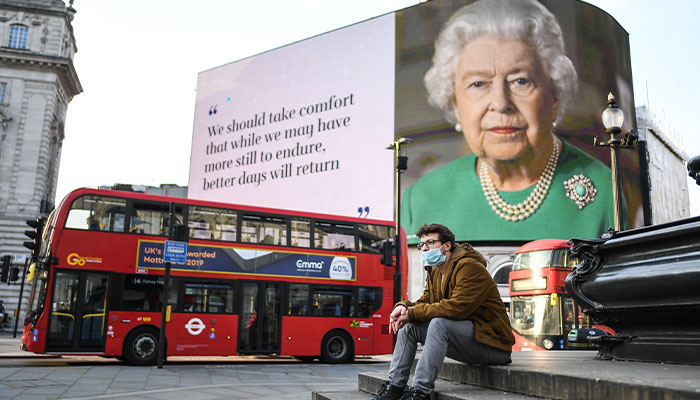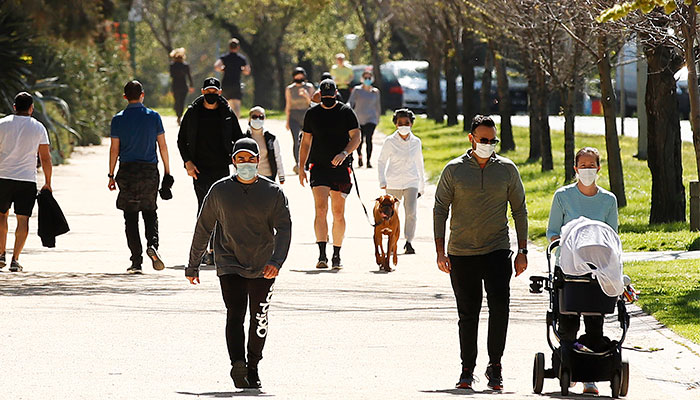While second waves of the COVID-19 pandemic sweep through Europe, broad-based testing is the most effective way to tackle the pandemic, Macquarie University researchers have concluded after a study of 40 countries.

Testing times: A drive-through COVID-19 testing clinic in Sydney ... results of the Macquarie study suggest mass testing should be at the forefront of efforts to suppress the pandemic death rate.
The study, published in the International Journal for Quality in Health Care, showed Australia, Taiwan, South Korea, New Zealand and Iceland had the lowest cumulative death rates. They also had the highest rates of testing of anyone who wanted a test regardless of their vulnerability.
Professor Jeffrey Braithwaite and his team at the Australian Institute of Health Innovation examined the health care systems in each country and assessed the answers to the following questions using established global databases:
- How prepared was the economy and the health system for the pandemic?
- When the pandemic hit, did the government put into practice stringent public health measures?
- How widespread was their testing of the population?
The US could have handled COVID-19 absolutely fantastically and led the world.
Amidst contested approaches to tackling COVID-19, such as mask wearing, social distancing, quarantines, curfews and lockdowns, these results suggest health policy makers should put mass testing at the forefront of efforts to suppress the COVID-19 death rate, rather than only those considered at risk.
To assess each country’s pre-pandemic capacity, the researchers looked at the Global Competitiveness Index. For stringency measures they looked at the Oxford COVID-19 Government Response Tracker Stringency Index, and for the approach to COVID-19 testing and COVID-19 cases and deaths, they used Our World In Data.
US best prepared, but leadership fails
The US had the most inherent pre-pandemic capacity to respond to the pandemic, the researchers found. After the 9/11 attacks by the Islamist terrorist group Al-Qaeda in 2001, successive US governments had developed systemic responses to deal with disasters. They also had established institutions such as the world-renowned Centers for Disease Control and Prevention.

Slow response: Countries such as the UK (pictured) were well prepared for a pandemic, but this did not reduce the death rate when they did not act quickly enough to instigate public health measures, the study found.
Also, just before leaving office, the Obama administration had compiled a comprehensive report on pandemic preparedness and simulated procedures for dealing with a pandemic.
“The US could have handled COVID-19 absolutely fantastically and led the world,” Braithwaite says. “Unfortunately, in 2020 it did not have the leadership from the White House to put that into practice.”
The researchers then looked at how quickly a country implemented public health measures, such as social distancing, mask wearing, quarantines and lockdowns. The team took a snapshot approach evaluating data over 61 days between 1 March and April 30.
Braithwaite states the lessons learned from the pre-pandemic preparedness and adoption of stringency measures remain relevant going forward.
We were pleasantly surprised that most workers thought that their country’s health system was doing a great job.
Even if the country was well-prepared pre-pandemic but didn’t act quickly enough, their preparedness did not reduce the death rate.
“Sweden, the US and the UK lost several weeks fighting the pandemic because they delayed implementing public health measures and when they did it was sporadic,” Braithwaite says.
Countries such as Italy, Iran and Spain, which had poor disaster preparedness and were slow at instigating public health measures predictably also had relatively high death rates.
In addition, while public health measures were very important, they were not enough on their own and had to be implemented early and stringently – and with competence and in accordance with the best evidence.
- Start Up program unleashes the entrepreneur in people with disabilities
- #EnvyFail: Have influencers lost their lustre in the COVID-19 era?
The researchers found that when countries such as Australia, New Zealand, Iceland, South Korea and Taiwan all put into place broad testing as well as early and rigorous public health measures, this combination resulted in the lowest number of deaths.
“These countries made sure that everybody who needed a test could easily get one, and they put in place, or already had, a robust system for managing the infection,” Braithwaite says.
He points out that there are two types of testing: narrow testing for people most at risk from catching the virus, such as frontline health workers and vulnerable people in aged care facilities, and then broad testing for anyone in the community.
Until there’s a vaccine or a cure for the pandemic, policy makers globally are going to have to find an equilibrium, Braithwaite adds. “The pandemic isn’t going away so to keep death rates low, countries will have to balance their economy - keeping it reasonably open so people can lead satisfying lives, with a very good regime for testing,” he says.
Frontline workers feel supported
Simultaneously, while policy makers focus on how to stem the pandemic, Braithwaite says that the majority of frontline health workers feel that they are well-supported. He co-leads a team that has completed a related study surveying the reaction of 1100 doctors, nurses and allied health workers around the world.
“We were pleasantly surprised that most workers thought that their country’s health system was doing a great job,” Braithwaite says. “High quality research like this contrasts with what we hear in the media. There is all this negative media cacophony but in reality, clinicians don’t seem to be doing too badly at the coalface.”
- Biology revolution: massive task to map every human protein is almost complete
- Why do mozzies bite some people and not others?
The survey revealed that four out of five people thought that an emergency pandemic plan was in operation in their workplace and they had adequate personal protective equipment, while just under two-thirds reported that healthcare workers received psychological support and 58 per cent accessed information to avoid burnout.
“As challenged as they most certainly are, the level of burnout for health workers may not be so dire in Australia – except maybe in Melbourne – but it is rampant in countries like Italy,” he says. “In our survey, across the world, many frontline staff felt their physical and psychological welfare was adequately catered for under the circumstances.”

Professor Jeffrey Breaithwaite (pictured) is Founding Director of the Australian Institute of Health Innovation, Director of the Centre for Healthcare Resilience and Implementation Science and Professor of Health Systems Research at Macquarie University.



